cam york
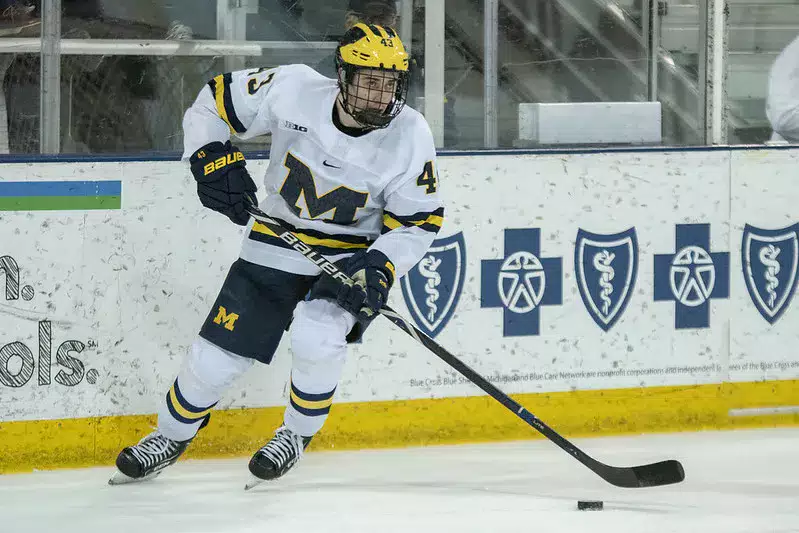
It's been a couple years since I last wrote a "Wolverines in the NHL" update. David and I have done a segment during the season on the HockeyCast devoted to it the last couple years, but a written piece can have a wider reach and can also be more expansive. Also, since the NHL regular season recently ended, I figured this was a proper time to do it, rather than in the middle of the season like our podcast segment. With the recent explosion of Michigan players heading to professional hockey, this year's update is longer than ever, so it's being broken into two pieces. Today is Part 1, where we'll cover the established NHLers, the studs, complementary players, and role players. Tomorrow will be updates on the younger NHLers, recent retirees, and all the alumni who have fallen short of the NHL but are still playing pro hockey somewhere in the world:
The Studs
These are the players who are considered high end, All-Star caliber. They are one of the three or so best players on their given teams and are getting paid premium money in the NHL:
Quinn Hughes, D, Vancouver Canucks: Already the best defenseman from the University of Michigan to ever play in the NHL, Hughes is likely to set a new milestone (when the awards are announced in June), becoming the first Michigan alumni to ever win the Norris Trophy for the NHL's best defenseman. Michigan State (Duncan Keith), Harvard (Adam Fox), UMass (Cale Makar), Bowling Green (Rob Blake), Boston College (Brian Leetch), and Wisconsin (Chris Chelios) have all produced a Norris winner... it's about time that Michigan got one. Hughes is likely to do it, the capstone of a marvelous season that saw him score 17 goals and 75 assists for 92 points, leading the NHL in the latter two categories for defensemen (he was tied for 6th with 17 goals by a D).
Hughes became one of 12 defensemen in NHL history to ever score 90+ points in a season, which is what will likely cement his Norris case. Hughes is the engine for everything that the resurgent Vancouver Canucks do, helping the team win their division for the first time in nearly a decade. He's a dynamic offensive force and a puck possession monster who drives play over all 200 feet, which allowed the Canucks to outscore opponents 92-55 with Hughes on ice at 5v5 this regular season(!!). A brilliant passer who has evolved significantly as a shooter and defender during his NHL career, Hughes is a no doubt top five defenseman in the NHL during his age 24 season.
Dylan Larkin, C, Detroit Red Wings: Few players in the NHL may be as linked to their team's wins and losses as Dylan Larkin is to the Red Wings. Anyone who followed Detroit's season knows that, a team that seemed to be headed to the postseason before an injury to Larkin in March submarined their season. The team looked almost unrecognizable without Larkin and it's not surprising why that's the case. The Red Wings captain potted 33 goals this season, the best goals-per-game mark of his career (coming in just 68 games). He also finished above 1.00 points-per-game this season for the first time in his career, probably reaching his apex at 27 and that's fine. Larkin's a very good NHL player, an important leader off the ice and a speedy playdriver with good offensive talent on the ice, playing a premium position with legit finishing talent. Though perhaps not a superstar of the Quinn Hughes variety, there are no teams in the NHL that would turn down the opportunity to put Larkin on their roster.

[Bill Rapai]
Zach Hyman, LW, Edmonton Oilers: I listed Hyman as a complementary piece the last time I did this article, which is still probably true in the abstract (in the sense that he complements his team's superstars), but when you score 54 goals, you have to go in the stud category. That's what Hyman did this season, blowing by his career high goal total by a full 18 goals en route to a staggering total that ranked 3rd in the NHL The three seasons since Hyman signed in Edmonton has seen his goal total increase in linear fashion, from 27 to 36 to 54, this season being the apex of the 31-year-old's career. Hyman is simply the perfect fit to play alongside the NHL's best offensive player, Connor McDavid. He posts up around the net and gets fed the puck, shots in tight, tips, deflections. Very few of Hyman's 54 goals have come outside of ~5 feet from the crease, with 15 of his goals coming on Edmonton's devastating power play. It may be true that Hyman wouldn't score that many goals on a team sans McDavid and Leon Draisaitl, but the skill and hockey talent of Hyman is now undeniable. He's a really good NHL forward.
Kyle Connor, LW, Winnipeg Jets: Two years ago when I wrote this piece Connor was coming off of a season akin to what Hyman has done this season, scoring 47 goals for the Winnipeg Jets. His two seasons in the meantime have fallen short of that mark but Connor remains a high level NHL goalscorer. Connor has now played seven real NHL seasons and has scored 30 goals or at a 30+ goal pace (in the case of the 56 game COVID shortened season) in all seven of them. He remains a pretty nonexistent defensive player, instead a one-dimensional rush scorer but when you average ~38 goals per 82 games over a seven season period, it doesn't much matter what else you do. You're a legit stud.
Zach Werenski, D, Columbus Blue Jackets: Not a ton has changed for Werenski since the last time we updated this article. He remains a very good offensive defenseman, scoring 57 points this season (ranking 12th in the NHL by a defender) in 70 games. This was the most games that Werenski has played in a season since 2018-19, as injuries continue to minorly hamper him, but his play remains pretty consistent. Werenski plays on a bad team, puts up a good number of points, generally wins his minutes, and collects a huge paycheck (still earning $9.5 M annually, near the top in the league). Werenski's not an elite defenseman, but he's a good top pairing puck mover.
[AFTER THE JUMP: more players]
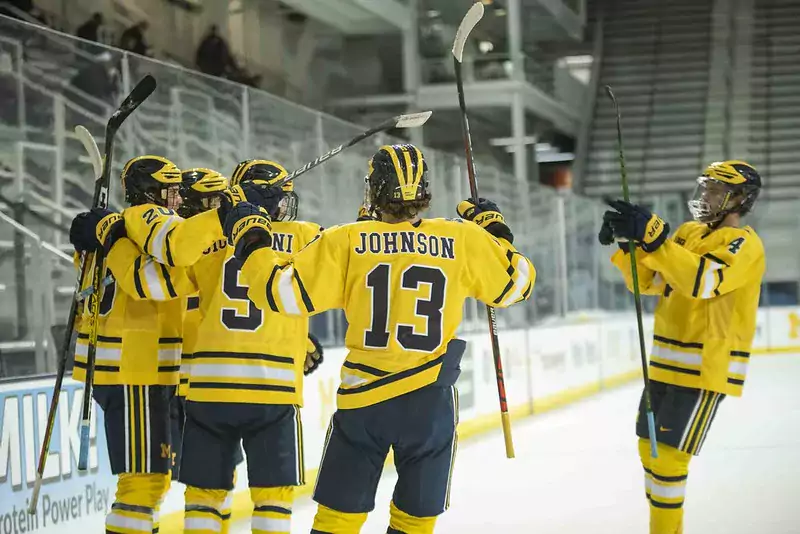
In 1972 the sport of hockey was changed forever by the Summit Series, a best of eight competition between the Soviet Union and Canada. After an extended period of divergence between the European game and the North American game, the Summit Series matched the Soviet Red Army team against the Canadian national team, which was basically just a Who's Who of NHL All-Stars. Team Canada expected to run the USSR out of the building but were stunned when they showed up and the Soviet team was weaving across the ice, criss-crossing with precision passing and carving the offensive zone like a thanksgiving turkey. At the time, no hockey team in the world had ever played like that, as the old style of "stay in your lane" forward play reined. Soviet hockey was a totally new paradigm to the game and was unlike anything anyone had ever seen before.
Canada still won the tournament (very narrowly), but the story resurfaced in my mind this weekend watching Michigan hockey because the shock that Team Canada felt in '72 is a lot like the shock ASU's players must've felt facing the Wolverines on Saturday and Sunday. Of course, hockey has long changed in the last 48 years. Lots of teams now play the way the Soviets did then, but rarely at the collegiate level are teams able to replicate that style. Michigan did, playing with pro precision and Soviet-like movement through the offensive zone, passing, cycling, and rotating chances. I would not label you a dunce if you thought you saw the Russian Five out there this weekend for Michigan. The Maize and Blue out-shot the Ice Devils 84-33 in the two games and outscored them 11-1. It easily could've been 15-1 or worse. Yeah.
Total and Complete Dominance
I don't like to plug my own tweets often, but I thought this is the best way I could sum it up on Saturday:
This does not look like two NCAA teams playing each other. And I don’t think that’s an indictment of ASU
— Alex Drain (@Alex_Drain) November 14, 2020
Arizona State is probably not a great team. They also probably aren't bad. I don't want to be burned like Michigan football was against Minnesota with a fool's gold win but this is an ASU team that was 4-3-1 against top 20 Pairwise teams a year ago, including a win and a draw against Denver and a sweep against Quinnipiac, and were 12-1-1 against the bottom 20 Pairwise last year. The Ice Devils rolled two of their top four scorers over from last season as well as their goalie and added an excellent recruiting class. I would guess they're somewhere between mediocre and good, yet they met a buzzsaw.
[AFTER THE JUMP: Hockey dominance]
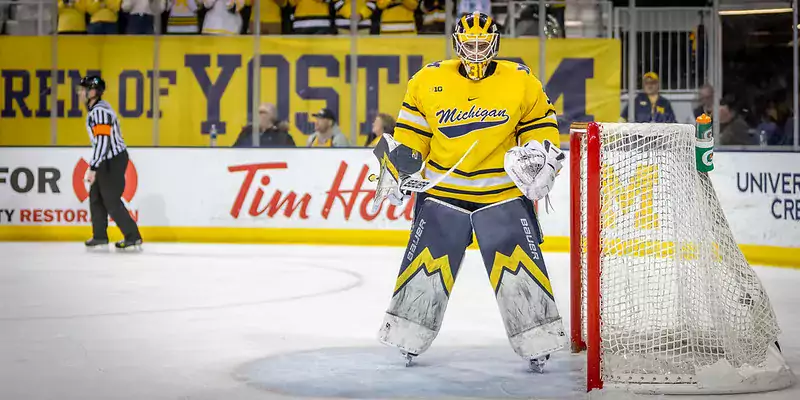
We’re back here for Part Two of MGoBlog’s 2020-21 Michigan Hockey season preview. Yesterday we kicked things off by looking at the forwards, which you can take a gander at here. Today we will be taking a long look at the defense and goaltenders, so let’s dive right in.
The Returning Defense: A Pretty Nice Base

Brian says that this player looks like an extra in a John Hughes movie [James Coller]
This post starts differently than the one on the forwards. That one began by focusing on the new guys since the scoring core of last year’s team was decimated by graduation. On the other hand, with the blue liners Michigan actually returns a pretty good group of players that should form a solid basis for this year’s team. The Wolverines return four of six starters, losing only two players to graduation, Luke Martin and Griffin Luce. Martin was a strong stay-at-home defenseman and Luce had a solid four year Michigan career, but neither player figures to be a huge loss and there’s a lot of upside in the returning core.
The biggest name is Cam York, a lottery pick of the Flyers in 2019 [insert Gritty joke here] and he had a respectable freshman campaign in the maize and blue. York was being asked to fill Quinn Hughes’ skates atop the first PP unit and though that was too much to reasonably ask of any player, York did a solid job. He posted 16 points in 30 games and was named to the B1G All-Freshman team. He’s not going to razzle dazzle like Hughes but he’s a mobile, puck-moving defenseman who does a lot of things well and isn’t prone to allowing the same sort of glaring odd-man rushes that frustrated Michigan fans in Hughes’ second season. Responsible, unsexy, and efficient, we should also credit York for having one of the best spoonerisms in current Michigan athletics (can’t touch Chuck Filiaga though). Expect York to be at the point on a power-play unit again this season and with more raw firepower on special teams, I could see York begin to approach a 0.8 PPG clip in the 2020-21 season.
[AFTER THE JUMP: solid veterans and exciting young guys]
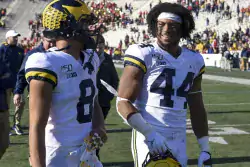
hockey: now with fewer acts than shakespeare
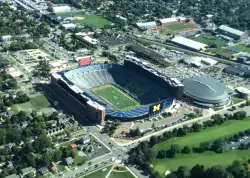
Were we a couple of injuries away from Harvard, seven seed?
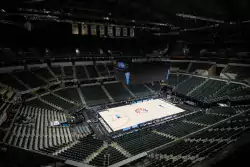
be nice, self isolate

pulse detected
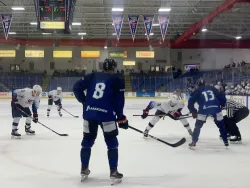
The WJSS is the unofficial start to the hockey calendar each year. Beecher and York participated for the United States and 2020 recruit Erik Portillo represented Sweden.

Burgeoning Beecher breakout boosts bockey brogram

lotta Erics in this one, fair warning

It's the biggest baseball game in ~60 years

the kind of accounts that point out cool new football stuff are embedding Michigan plays again
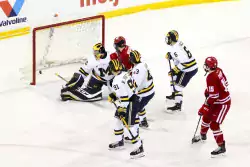
why hockey was meh and if they'll get better
29